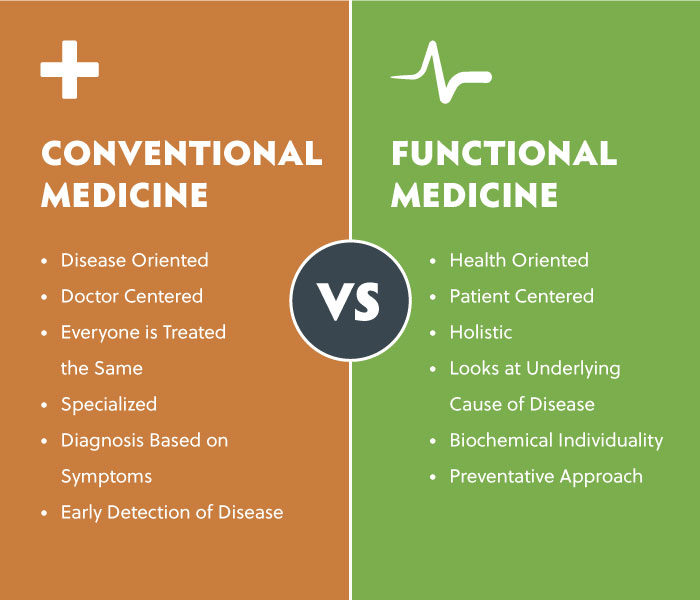Functional Medicine embraces much of the philosophy of Integrative medicine but also employs a systems-oriented medical approach that works to identify and understand the underlying or root causes of a disease. This discipline takes into account the personalization of healthcare, as each patient care plan is distinct and unique. The relationship between patient and practitioner effectively becomes a partnership; every aspect of a patient’s medical history is reviewed in detail. Much like integrative medicine, functional medicine treats the individual rather than the disease.
Often, individual genetic and environmental research is conducted to obtain a deeper knowledge of the patient’s health status. Understanding the biochemical individuality of a patient can lead to the underlying causes of disease and furthermore, the prevention of additional health risks in the future. Functional Medicine has gained much popularity, even spurring the creation of the Institute for Functional Medicine. Personalized medicine is without a doubt, the future model of medical care.
espanapildoras
Functional Medicine addresses the underlying causes of disease, using a systems-oriented approach and engaging both patient and practitioner in a therapeutic partnership. It is an evolution in the practice of medicine that better addresses the healthcare needs of the 21st century. By shifting the traditional disease-centered focus of medical practice to a more patient-centered approach, Functional Medicine addresses the whole person, not just an isolated set of symptoms. Functional Medicine practitioners spend time with their patients, listening to their histories and looking at the interactions among genetic, environmental, and lifestyle factors that can influence long-term health and complex, chronic disease. In this way, Functional Medicine supports the unique expression of health and vitality for each individual.
- Functional Medicine offers a powerful new operating system and clinical model for assessment, treatment, and prevention of chronic disease to replace the outdated and ineffective acute-care models carried forward from the 20th century.
- Functional Medicine incorporates the latest in genetic sciences, biological systems, and understanding of how environmental and lifestyle factors influence the emergence and progression of disease.
- Functional Medicine enables physicians and other health professionals to practice proactive, predictive, personalized medicine and empowers patients to take an active role in their own health.
- Acknowledging the biochemical individuality of each human being, based on concepts of genetic and environmental uniqueness
- Incorporating a patient-centered rather than a disease-centered approach to treatment
- Seeking a dynamic balance among the internal and external factors in a patient’s body, mind, and spirit
- Addressing the web-like interconnections of internal physiological factors
- Identifying health as a positive vitality—not merely the absence of disease—and emphasizing those factors that encourage a vigorous physiology
Promoting organ reserve as a means of enhancing the health span, not just the life span, of each patient


